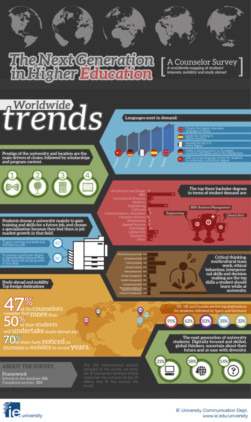
What’s unique about the state of education today? It is globally oriented, courses are internationally relevant and degrees mutually recognised.
As a result of this, more and more students are drawn from countries around the world to opt for higher education in universities of international repute on foreign shores. The trend in vibrant and growing economies such as India, Brazil, China and South Korea is to send a huge contingent of undergraduate students to universities in the US, UK, France, Spain and other countries. The IE University in Madrid, Spain, one of the most prestigious universities in Europe, conducted a survey earlier this year to examine this phenomenon by interviewing 204 counsellors from international schools based in more than 33 countries. The survey questions focused on issues like mobility, study abroad, and levels of interest in different university degrees.
In an exclusive interview with Education, Antonio de Castro, Dean of Undergraduate Studies at IE University, Madrid, Spain, spoke at length about the long-term global impact of this trend on higher education prospects in the coming years and the chief motivating factors that propel the generation next in certain directions to pursue quality education.
What was the purpose of conducting this survey?
It was to pinpoint trends in the upcoming generation of university students. The findings of the survey were used as a basis for discussion about how new generations see their future in higher education. Those involved in the discussion were members of our Junior Advisory Board, comprising students aged between 16-18 years old, who come from schools from all around the world and who meet each year at IE University.
From the survey, it appears that US still remains the most popular destination for higher education and is likely to remain so followed closely by UK. If the preferences of the next generation have not changed, what does it bode for other countries that offer higher education?
Both the US and the UK have played an important role in the field of higher education over the last few centuries, and have inspired institutions throughout the world. However, in the last few decades, new players have entered the market and challenged the status quo. In the last 10 years, Europe has created the European Higher Education Area (EHEA), which enables student mobility and the opportunity to secure common university credits in over 47 countries. Spain is, in fact, the No. 1 destination for study abroad programmes for European students (according to recent data from Erasmus).
Asian Universities are reaching the uppermost rungs in major international university rankings, whilst Dubai, Abu Dhabi and Doha have created international hubs of higher education since they are able to attract top players in the field. I would say higher education is facing the challenge of answering the needs of the global market, and there are many opportunities for academic centres of excellence to develop around the world. Hence, this diversity enables students to choose the right career path which tallies with their career expectations wherever they might be.
The survey indicates that BBA remains the most preferred course for undergraduates with a preference for engineering in Middle East and Africa – how will that effect the skill sets of the future generation of students.
We have to consider that this is a perception of high school students regarding current, short-term market demands. In the West, more students search for general soft skills which can be easily adapted to multiple situations and an evolutionary economy based on new services, but this does not mean there is not a demand for more specific and technical skills. In the Middle East and Africa, in view of the present economical situation, the focus is on the development of infrastructures where these technical skills are required, but there is also room for the development of other professional profiles.
The trend indicates that more than 70 per cent of students are likely to leave their countries in search of higher education degrees. How will this affect the global economic climate in the long run?
Diversity is probably one of the great challenges of the future. Students during their professional careers will be required to work in multicultural teams or solve problems in a variety of geopolitical contexts. It is really interesting to see how diversity also develops the learning experience. An example of this is at our university where there are more than eighty nationalities. So in one classroom, students can discover multiple ways to approach the same problem. Different cultural points of view focus on the same topic under debate. This is really enriching and aims to prepare a new generation of global citizens in a better way.
How does the supremacy of English as the language of instruction world wide instruction affect the future prospects of other languages?
Universities in continental Europe which offer programmes with English as a core language are noticing sharp increases in foreign students due to rising mobility. English has now been further consolidated as the lingua franca of education on a global level. This doesn’t mean other languages are not important in order to be able to understand and interact on an international basis. It only shows the predominance of English in business.
In the US, according to the survey, one of the most important deciding factors for choosing a university is prestige and location, while in Europe, it is content. What does this imply?
Academic excellence is surely the most important driver globally when a potential student looks for a university in all countries.
Students are increasingly moving towards obtaining a good degree to get a good job… will this make competition in the international job market tougher?
A good degree has to provide the right skills for the present and the future and these skills are not limited to a particular job profile. Maybe a clear difference between vocational training and higher education is based on the following - university degree skills should allow students to adapt to a job which does not exist at the present. Also, the idea of lifelong learning has to be part of the professional life of university graduates: a bachelor degree is not the ultimate goal but the commencement of continuous education whilst professional experience evolves.
The survey reveals interesting facts on the importance of skills other than academics that students need to develop while at university. This indicates that the emphasis in future jobs is more likely on how versatile the student’s skills are rather than pure academic strengths.
In a global world, we cannot regard individuals as isolated beings and we cannot make individuals disappear within the general mass either. We have to avoid conceptions which have been passed down from the last century. Today, higher education focuses on skills and these skills have to be two-pronged: on one hand, they have to be based on the personal conditions of each student and reinforce the student relational dimension. On the other hand, even if these skills are formulated and developed in the present, they have to be forward-looking in order to respond to the new demands of a professional in a transforming economic environment.
One of the most important conclusions of the study was that the next generation of students remain largely uncertain about their futures. Can you elaborate on that?
This uncertainty is a natural reaction as high school students have to start taking decisions which have a real impact on their lives. In this respect, school and university counsellors have to play an increasingly important advisory role which goes beyond that of mere information and public relations providers. Nowadays, universities have to help their students develop into professionals and citizens of the future but we realize that the general atmosphere is dominated by uncertainty. The economic and financial crises in western countries have generated a transitional period between the previous socio-economic model which is not able to continue and the search for a new model. In this context, uncertainty in young people is completely understandable and universities have to be able to not provide answers but provide tools to deal with the future.
The study is based on the database accessible and available to IE University? Does that in any way impact the outcome of the study?
This survey was organised as a starting point this year by contacting the 826 International Schools in more than 50 countries which IE University International Offices and Admissions have around the world. This was done through our 25 offices. This sample was made up of 80% private institutions and 20% public ones. This study can’t be regarded as a massive survey but rather as a trend scanner for counsellors to ascertain their students’ interests. I think the survey is accurate as it covers key people who assess school students‘ university career choices and we hope to be able to incorporate more schools in future surveys.
Once a survey is done and the results are revealed, it is important to act on the outcomes. Is this being done to remedy the situation?
As far as IE University is concerned, we have already started to analyse the outcome within the Junior Advisory Board. The Academic Management team at the university will also use the outcome as a key element to be taken into account when programming the 2014-2015 academic year. We believe interaction between the university and schools via their counsellors and the future generation of students is crucial in order to enable higher education centres to develop their learning methodologies and answer the needs of the students of tomorrow whilst maintaining academic excellence which is a core value. We are convinced other universities could benefit from this survey which has been widely promoted.
(Next week: Dubai-based counsellors who participated in the IE survey comment on the overriding trend amongst current students with an emphasis on the Middle East.)













